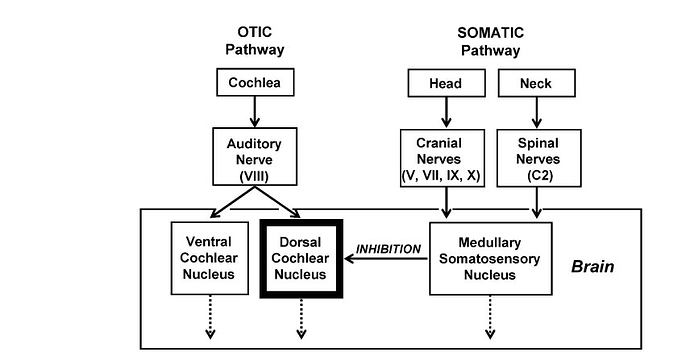Look no further than this Doctor: Idrope dell'Orecchio: Sintomi, Diagnosi, Terapia | Dr La Torre
Interesting, I actually can get a tinnitus in my right ear when chewing hard (clenching). It’s very mild and higher pitch than my normal left ear tinnitus, but it definitely corresponds to the clenching.
Oh I can get what we affectionately call in our house ‘Jaw Clunk’ when I chew really heavily. Usually on crusty rolls after I’ve had to open my jaw a bit wider than usual but that never seems to increase the tinnitus. Him Indoors gets the same. Think it’s cartilage connected.
This is nothing like that of course. This is an increase in high pitched tinnitus.
Jaw Clunk is mild TMJ I should imagine. Yes, and that would involve cartilage. I had it for 4 years until my brain and muscles synced up again. Some level of harmless ‘TMJ’ is probably inevitable as your body loosens a little the older you get.
Yup, that’s exactly how it is for me. A very high pitched separate but mild tinnitus on top of the normal one and only for the period of force. It cuts off immediately after releasing the pressure.
I can also modify my tinnitus momentarily by jerking my head to the bad side.
It’s clear to me this must reflect higher than normal pressure within the inner ear. It’s clearly ‘hooking up’ with blood pressure and as you increase the local blood pressure by clenching or jerking, it puts pressure on the internals of the inner ear. Take away that pressure, and the effect goes away. Open and shut case if you ask me! No-one is going to convince me this is a several or split second ‘migraine’ that conveniently co-incides exactly with pressure or movement … lol!!
The cause of pulsative tinnitus is then obvious to me too. It’s when the local physiological conditions of the inner ear have caused the pressure to rise more than usual, hooking up the local pressure with blood pressure more directly, causing you to hear your pulse.
The one open question for me is why this mostly affects the high frequency, not the low frequency. What is it about the anatomy that causes that? Because the pressure is presumably distributed across the inner ear, or is it? The only anatomical morsel of wisdom I found was that the structure of the cochlea at the higher end of the spectrum is less compliant, so perhaps stresses build up there that don’t at lower frequencies?
btw, I suspect the exact same thing happens on the labyrinth side. Early on in the condition this significantly distorts the sensors from where they would normally be and causes the neurological fallout because your brain is expecting a different response. Over time the pressure subsides so the distortion decreases and your brain gets used to the new status quo. This is also the reason why you get the BPPV like symptoms. It’s why initially its very uncomfortable to lie down in bed especially rolling sideways.
Agreed but migraines might be able to increase the peak volume of the tinnitus… meaning migraines could make it worse. Migraines can affect the vasculature - I still wonder if my left ear’s hearing loss was due to a vasospasm brought on partly or fully by migraine thereby cutting off blood flow to part of my cochlea. Or something completely different… Maybe they’ll find out when I die as I’m donating my temporal bone…
One wild guess from me is that the cochlea is a spiral where the inner part is responsible for high frequency and the outer part low frequency (or did I get that backwards?). And perhaps the inner part of the cochlea has smaller and more intricate blood vessels which are proportionally easier to modulate by physical pressure.
https://www.dizziness-and-balance.com/disorders/hearing/tinnitus/somatic%20tinnitus.html
One can be easily convinced that somatic tinnitus exists by simply clenching one’s jaw. This maneuver often causes an increase in volume or change in pitch of tinnitus
Levine provided an extensive list of maneuvers (2007) including various types of jaw movements, isometric head/neck contractions, and pressure on muscle insurtions around the ear and SCM muscle, and were able to induce tinnitus in 80% of their study population of 62 volunteers
Another superficial label without an aetiology? Who’d have guessed it?
So when this occurs only in an affected ear without the issue occurring in a “good” ear I’m supposed to put this down to a permanent migraine?
Don’t see any mention of migraine in the article.
Oh if it’s not migraine how come this problem only occurred after the onset of MAV?
Sorry. Just not believable.
Point in case not all tinnitus is hydrops related. And jaw clenching causing tinnitus change is’nt conclusive of hydrops either.
I didn’t just get two completely different ear conditions simultaneously!
any science to backup jaw clenching causing tinnitus change is hydrops ?
I doubt such a study exists. There’s precious little on graded hydrops and correlation with symptoms because large scale imaging for that level of detail does not exist.
Equally where are the studies that say it’s not? Ie does/does not occur in the presence of Hydrops? Suspect we’ll have to wait.
But absence of evidence is not evidence of absence. None of this is well explained by any ‘science’.
My personal experience is that I did not have this issue before being diagnosed with Hydrops by a professor.
So in my case it’s completely logical that it is as a result of Hydrops.
Your professor based the hydrops diagnosis only cos of the trauma in your case.
why did you extrapolate your specific diagnosis to non-trauma cases as well and have a generalized assumption everyone on the forum has hydrops ?
Because Hydrops can occur not just a result of trauma. (Certainly no less bad than noticing people having migraines along with their vertigo and dizziness and then generalising that migraines are the ultimate culprit!)
